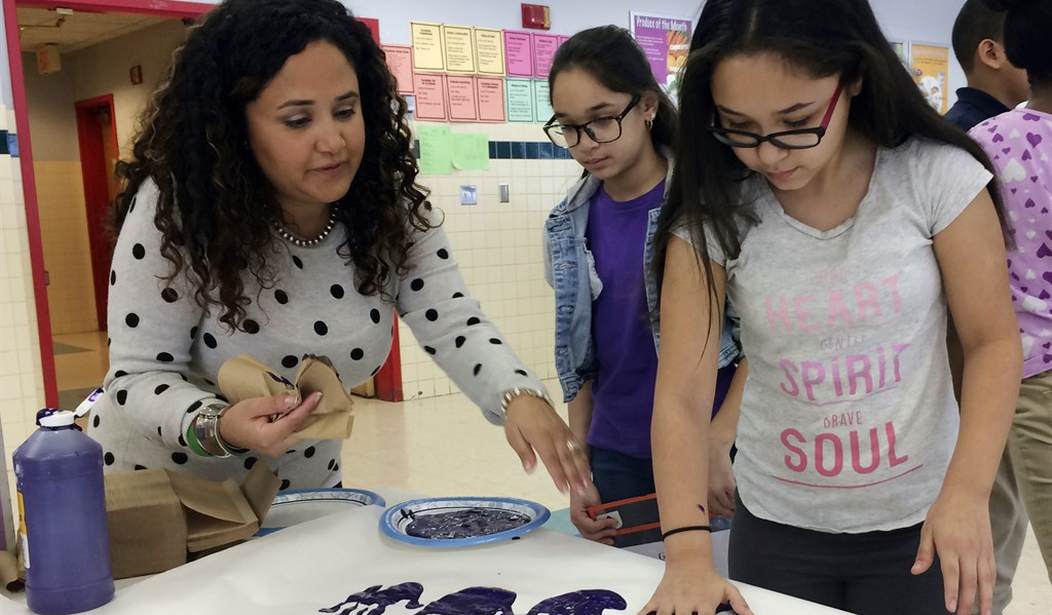Abigail Shrier's previous book was about the sudden rise of gender dysphoria, especially among young girls. As you've probably heard, Shrier was made a pariah and even the American Booksellers Association had to offer an apology for sending the book to bookstores, calling its own actions a "serious, violent incident."
Today Shrier has a new book out and this one seems likely to draw more criticism. Bad Therapy: Why the Kids Aren't Growing Up argues that schools have become fixated on examining and managing children's emotional states, to the point that they are often doing more harm than good. Shrier says the phrase which has taken over education is "social-emotional learning."
Often traveling under the name “social-emotional learning,” bad therapy had gone airborne.
When I first heard the term social-emotional learning, I assumed a hokey but necessary call for kids to get a grip. Or maybe it was the new name for what they used to call character education: treat people kindly, disagree respectfully, don’t be a jackass. Proponents insist it arrives at those things, albeit through the somewhat circuitous route of mental health. Sometimes described by enthusiasts as “a way of life,” social-emotional learning is the curricular juggernaut that devours billions in education spending each year and more than eight percent of teacher time. (Many teachers say they try to ensure that social-emotional learning happens all day long.) Through a series of prompts and exercises, SEL pushes kids toward a series of personal reflections, aimed at teaching them “self-awareness,” “social awareness,” “relationship skills,” “self-management,” and “responsible decision-making.”
One aspect of this new focus on kids emotions are daily "emotions check-ins" which teachers hold with students in order to determine how kids are feeling. Shrier spoke to a couple of professors who suggested this sort of thing seemed designed to make kids more fragile and less capable of taking on challenges.
I asked Leif Kennair, a world-renowned expert in the treatment of anxiety, and Michael Linden, a professor of psychiatry at the Charité University Hospital in Berlin, what they thought of practice. Both said this unceasing attention to feelings was likely to make kids more dysregulated.
If we want to help kids with emotional regulation, what should we communicate instead?
“I’d say: worry less. Ruminate less,” Kennair told me. “Try to verbalize everything you feel less. Try to self-monitor and be mindful of everything you do—less.”...
“If you want to, let’s say, climb a mountain, if you start asking yourself after two steps, ‘How do I feel?’ you’ll stay at the bottom,” Dr. Linden said.
There's another problem that Shrier sees in getting teachers involved in these kinds of frequent emotional interventions with children. Teachers aren't trained for this and don't have the educational background to deal with it appropriately.
Ever since her school adopted social-emotional learning in 2021, Ms. Julie routinely began the day by directing her Salt Lake City fifth graders to sit in one of the plastic chairs she’d arranged in a circle. “How is each of you feeling this morning?” she would ask, performing a more intensive version of the “emotions check-in.” One day, she cut to the chase: “What is something that is making you really sad right now?”
When it was his turn to speak, one boy began mumbling about his father’s new girlfriend. Then things fell apart. “All of a sudden, he just started bawling. And he was like, ‘I think that my dad hates me. And he yells at me all the time,’ ” said Laura, a mom of one of the other students.
Another girl announced that her parents had divorced and burst into tears. Another said she was worried about the man her mother was dating. Within minutes, half of the kids were sobbing. It was time for the math lesson, but no one wanted to do it. It was just so sad, thinking that the boy’s dad hated him. What if their dads hated them, too?
Teachers are supposed to teach subjects like reading, science and math to students. They are not trained to hold group counseling sessions for sobbing children. Of course there may be some extreme circumstances where emotional reactions in the classroom are inevitable but there's no call for a teacher to invite these reactions on a daily basis, as if this sort of thing should seem normal in a classroom setting.
The recent evidence that kids are struggling with mental health issues at record levels means the need for appropriate responses are important. But there's always a risk that a poor understanding of the issue will only make things worse. Teaching kids and teens that they are all victims of trauma which needs to be discussed at school seems like a very bad idea. Kids must not be taught to emotionally catastrophize every challenge they face. Dwelling on problems can make them worse by making kids feel less capable of dealing with them. Is that what we're going for here?







